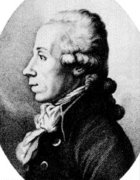Martin Heinrich Klaproth
Klaproth, Martin Heinrich
 Klaproth (Source: WISC)
Klaproth (Source: WISC) Martin Heinrich Klaproth (1734-1817), a German chemist who discovered and helped verify many important chemical elements, including uranium and zirconium. In 1789, Klaproth dissolved pitchblende, primarily an ore of iron and zinc, in nitric acid. When neutralized by potash, a yellow precipitate revealed the presence of new earth that must contain a new element. Klaproth named the new element uranium after the planet Uranus that had been discovered by William Herschel eight years earlier, named after Uranos, the Greek god of the heavens. Klaproth also discovered zirconium (1789), strontium (1793), titanium (1795), chromium (1797), tellurium (1789), and cerium (1803). Klaproth published actual weights of samples and precipitates so any errors were apparent, and he addressed sources of errors by developing procedures to purify reagents, avoid contamination from apparatus, and introduced drying samples until constant weight was obtained. Klaproth’s experimental methods added rigor to the field of chemistry.
Further Reading
The Elements: Names and Origins (BBC Online)